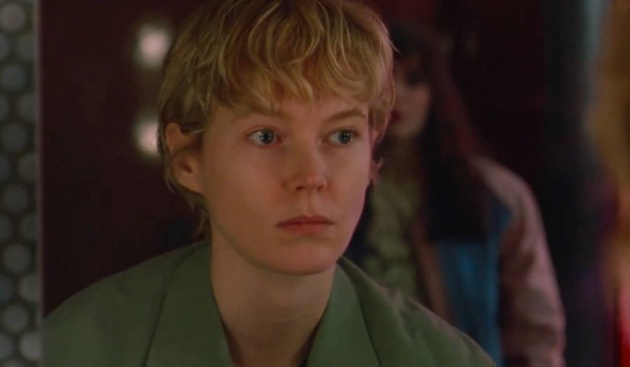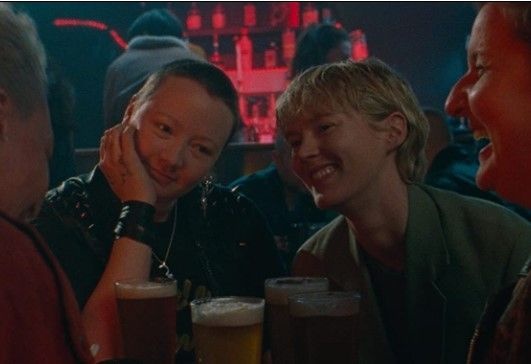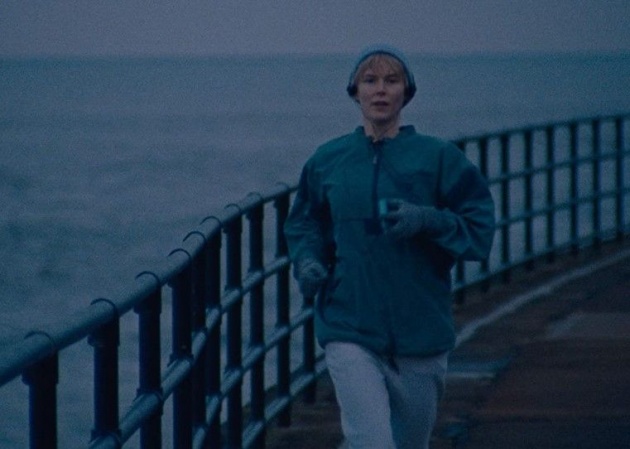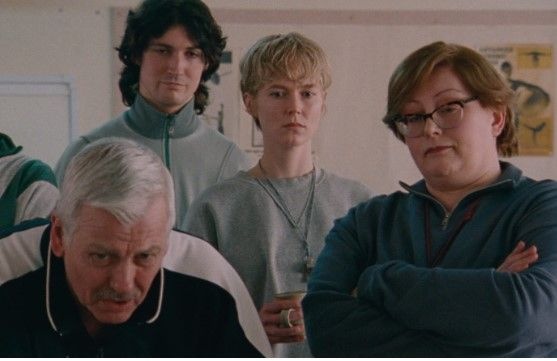
Pictured: Who's that girl? Physical Education teacher Jean Newman (Rosy McEwen) is surprised to see pupil Lois Jackson (Lucy Halliday) in a gay club in a scene from the 1980s set British drama, 'Blue Jean', written and directed by Georgia Oakley. Still courtesy of BBC Films/Altitude Film Distribution (UK)
Though homosexuality was decriminalised in the United Kingdom in the late 1960s, suspicion and a lack of empathy has governed attitudes towards it in the subsequent decades. Gay culture is perceived as threatening and corrupting, in spite of evidence to the contrary. There is a spurious argument that if you don’t mention something – same sex attraction, gender dysphoria – then it ceases to exist. Women need men to procreate – isn’t that the point? The fact that heterosexuality has a violent strain – domination fantasies, rape – is ignored. Sexuality exists alongside consent and if consent between participants of a sexual act is given by those capable of granting it (and that is in itself a contentious issue) then it becomes a personal matter outside of legislation.
Blue Jean, the confident if not entirely satisfactory first feature of writer-director Georgia Oakley, is a drama set in Northern England in the late 1980s about a lesbian Physical Education teacher, Jean Newman (Rosy McEwen) whose balancing act – hiding her sexuality whilst maintaining her job in a comprehensive school – is tested when a pupil, Lois Jackson (Lucy Halliday) enters her world. The film is set at a time when Section 28 of the Local Government Act, 1988, was in force, prohibiting the teaching of homosexuality in schools. The subject is resonant because currently, in the US State of Florida, school and library books are banned for their ideas, following the introduction of the Stop Woke Act, that prohibits in-school discussions about racism, oppression, LGBTQ+ issues and economic inequity. In short, it is an attempt to institutionalize kitsch, which Czech author Milan Kundera memorably described as ‘a world without sh-t’.
Blue Jean features a sexual bully, Siobhan (Lydia Page), a schoolgirl in the netball team who sees Lois as a rival for her attention for Jean. This becomes a catalyst for the film’s drama, but then falls out of scope. Siobhan isn’t punished for her behaviour. Indeed, Oakley is more interested in the response – or lack of it – to such bullying, how letting people get away with the exercise of their prejudices damages others. Except that Jean shows Lois a pathway to a New World.
The title stems from Jean describing herself as damaged, rather than melancholic. That she wears a blue jogging outfit and is seen running at a cliff edge by the sea is close to a visual metaphor of her way of living. Having worked in government offices in the 1980s alongside individuals whose sexuality was never openly discussed, I can confirm that Oakley’s portrayal of a workplace environment, vibrating with rumour and false indignation, is accurate. In her public persona, Jean is repressed. She refuses to go to the pub with colleagues, claiming at one point that she is minding her nephew. She wears her hair short, almost Tomboy-like, but dyed blonde, a concession to femininity. For the most part, she doesn’t wear lipstick.
The opening features lushly romantic strings on the soundtrack, steam, a dripping tap, and the mixing of powder in a pestle. Jean is dying her hair. Her evening, alone at home, is interrupted by the light of a passing car. Jean stands up when it passes as if the light was specifically targeting her window. She is under surveillance from the neighbour opposite, an older woman whose expression of disapproval doesn’t change throughout the movie. In narrative terms, Jean’s anxiety about the light isn’t discussed, although we later discover that she was married – her sister displays a photograph of Jean in her wedding dress, claiming that she does not have a more recent one, in a defiant gesture of heteronormative conservatism. Could Jean be afraid that her ex-husband might turn up? It isn’t clear.
When cosying up to her unmistakably out lover Viv (Kerrie Hayes), Jean is less inhibited, except when her sister comes to call, begging for a baby-sitting favour. Cue the pulling on of clothes and consigning Viv to the kitchen. ‘Don’t tell me how to be with my family,’ Jean cries to Viv, having dangled the opportunity to a five-year-old boy of watching cartoons, and then planting him on the sofa in front of ‘Blind Date’, the popular 1980s heteronormative entertainment show hosted by Cilla Black, full of torturous puns and even more torturous questions to contestants. By contrast, faced with watching ‘Blind Date’, Viv turns the TV off and parodies the asinine pledges of women hoping to be picked. Jean gives her nephew a bath and then is splashed by him. She responds angrily and then embraces him warmly in a towel, apologising for her temper. In their second scene together, in Jean’s sister’s house, the boy wants to have Jean’s non-chicken dish. When his parents refuse, the boy drops his plate on the floor in protest. His father reprimands him as the boy runs away. The meal illustrates Jean’s potential to ‘corrupt’, as an example to be copied, justifying her decision to express her sexuality in a clandestine manner, or more accurately showing her friends how good she is at pool.

Pictured: Viv (Kerrie Hayes) and Jean (Rosy McEwen) enjoy a pint and a laugh in the 1980s set British drama, 'Blue Jean', written and directed by Georgia Oakley. Still courtesy of BBC Films/Altitude Film Distribution (UK)
The 1980s of Oakley’s film is a time of ‘zines – independent magazines often printed on non-traditional dyed paper that spoke to niche audiences. Jean’s friends read the ‘lonely hearts’ adverts in one such magazine. Later, one of Jean’s school colleagues removes a gay-themed magazine from Jean’s desk. ‘Any idea who put it there?’ Jean is asked. ‘Yeah,’ replies Jean, lying. The film is punctuated by news broadcasts, mostly on the radio but in one instance on television, describing the introduction of Section 28. Jean’s colleagues sympathise with the sentiment behind it. ‘Children have such vulnerable minds,’ remarks one teacher.
Some of the dialogue is on the nose. ‘Does anyone know what fight or flight is?’ Jean asks her gym class. What this has to do with netball is anyone’s guess, but clearly Oakley refers to Jean’s instincts to maintain her secret sexual identity – she chooses flight rather than fight. Early on in the film, Jean is passed a note. She needs to address the author, though it is not clear whether she does so. Her whistle blowing on the court commands; her whistleblowing in the head teacher’s study is less visible.
Onto Jean’s court steps Lois, who immediately elects to sit out the practice session, attracting suspicion. Jean sits next to Lois, an act noticed by Siobhan. As framed by cinematographer Victor Seguin, Jean doesn’t immediately share her (screen) space with Lois, a visual representation of her uneasiness. Jean promises to sort out a kit for Lois; Siobhan is jealously sensitive to this as well. At the end of the session, Lois skips off. Her first appearance in the drama is through the gym window, when she is seen showing her football practice. Jean has a conversation about her joining the football team. ‘And you’ll teach the boys netball?’ scoffs her male colleague. Jean confirms that she would.
In Lois’ second session, she is shown how to block another player without touching them. Jean places her hands on Lois’ shoulder and the scene becomes tense, focussing on the peril of physical contact. Lois fails to stop another player from throwing the ball through a basket. Later, Jean watches Lois in the playground, perfecting her throw.
Jean’s relationship with Viv is prickly; Jean consistently has to prove herself. Not in bed, where there isn’t an issue, rather in the neighbourhood. Viv asks to attend one of Jean’s matches; Jean remarks that Viv would stick out like a sore thumb. ‘That isn’t kind,’ remarks Viv. While Jean drives a car, its chassis serving as a protective shell against the gaze of others, Viv rides a motorbike. Jean joins Viv for a ride, her helmet up so she can feel the wind on her face. The meaning of the gesture is inexact. On the one hand, it portrays recklessness. The visor should be pulled down to protect Jean’s face. But raising the visor she is allowing herself to be recognised, out and proud. By the end of the ride, the visor is pulled down.

Pictured: Morning run. Jean Newman (Rosy McEwen) in a scene from the British drama, 'Blue Jean', written and directed by Georgia Oakley. Still courtesy of BBC Films/Altitude Film Distribution (UK)
When Jean walks to the bar at a lesbian club and sees Lois there, she is shocked. Lois doesn’t look like any of the other women there. Jean is keen not to be recognised, but Lois identifies her in the bathroom. After Lois ingratiates herself with Jean’s friends, Jean confronts her in the bathroom. Viv misconstrues this, believing Jean to be flirting with the teenager. Paranoia is not confined to heterosexuals.
Jean’s intention is to warn Lois off (‘it’s my life,’ she tells her) but Lois is unwilling to listen. Meanwhile, Siobhan taunts Lois about her type, then asking about lesbian kisses. The two of them fight. They are pulled apart, but Jean does not report the incident.
After another game, Siobhan approaches Lois in the shower and kisses her. When she knows she is being watched by Jean, she screams. A second teacher appears and Siobhan claims to have been assaulted. In the head teacher’s office, Siobhan is coaxed into nodding to confirm the assault. Jean is asked what she saw. As Lois rightly says, no one asked for her version. She is subsequently suspended.
Jean is culpable for failing to speak up in support of Lois. Guilt consumes her. She joins colleagues for a drink, a man taking his seat next to her. The incident also encourages to admit to one of her brother-in-law’s friends that she is a lesbian and happily divorced. She leaves a children’s party at her sister’s house in a state of giggles, though it is unclear whether she is expressing despair.
By this time, Viv has dropped her. An attempted rapprochement at a café is unsuccessful. Jean lights a cigarette. ‘You can’t smoke in here,’ the off-screen proprietor tells her. ‘What are these for?’ asks Jean, pointing to an ashtray. The scene is humorous but there is the suggestion that Jean is prohibited from acts accepted in a heterosexual.

Pictured: 'Young people have such vulnerable minds.' A scene from 'Blue Jean', a British drama written and directed by Georgia Oakley. Still courtesy of BBC Films/Altitude Film Distribution
Jean desperately needs to apologise to Lois and finds a way of doing so, taking her to a communal flat, and introducing her to BOG, which may mean ‘Beneficiaries of Girls’. Lesbians who have jobs, like Jean, support those who don’t. Jean is not just gay, she’s a gay ally, a net contributor.
Will Jean and Viv get back together? At the party, Viv finds Jean having a cigarette. ‘What are you doing out there?’ ‘I’ll be back in there in a minute,’ she replies. On the drive to school, a Conservative billboard, arguing that politics should be kept out of education, has been defaced. Jean arrives at a school. She is still teaching.
The soundtrack is filled with 80s synthesizer pop, the sound redolent of an alternative clawing its way into the mainstream. Jean has a white cat, who, at one point, hovers over a fish tank. Surprisingly, Jean’s nephew isn’t seen petting the cat. Jean is shown reading ‘Alice’s Adventures in Wonderland’ to her nephew, before the boy is summoned outside. She is also seen with a copy of Radclyffe Hall’s ‘The Well of Loneliness’, a seminal piece of lesbian literature. At one point, Jean is in a club staring at a gay male exotic dancer with something akin to longing, not that she desired the dancer, rather than she wish she could make a public display of her desire. ‘I’m damaged,’ she tells Lois. ‘But you don’t have to be.’ Jean can’t set Lois an example, but she can introduce her to others.
But what of Siobhan? Her sexuality is at best ambiguous. Doesn’t she deserve a place where peer pressure doesn’t drive her to humiliate others? The most unsatisfactory aspect of Oakley’s screenplay is that she does not round off Siobhan’s story. In this film, there are no concerned parents. Reality is stripped down.
The film begins with Jean dying her hair. Perhaps it should have ended with her washing the dye out. The drama is not entirely satisfactory. The performances though are uniformly convincing, notably Kerrie Hayes, who conveys Viv’s bullish vulnerability. Her exchanges with Jean fly. ‘I didn’t want you to be another Donna,’ Viv tells Jean. ‘Donna left you for her husband,’ Jean explains. ‘You are kind of the same,’ Viv replies weakly. By the end of the film, we are led to believe that Jean has chosen to fight rather than take flight. In that regard, Jean displays the courage of her generation.
Reviewed at London Film Festival, Friday 7 October 2022, 11:30am, Picture House Central (press screening); Saturday 11 February 2023, Curzon Canterbury Westgate, Screen One, 21:00 screening



